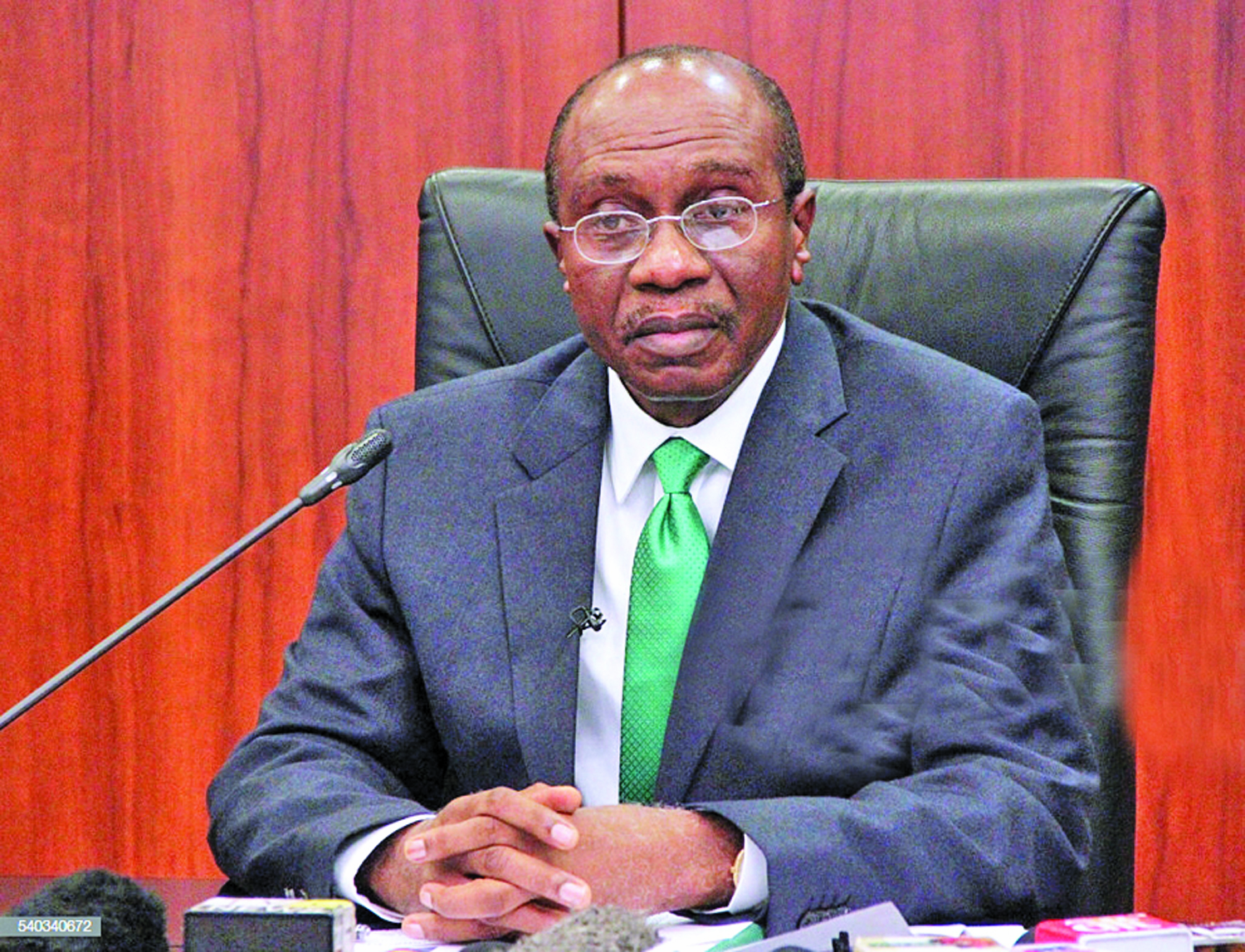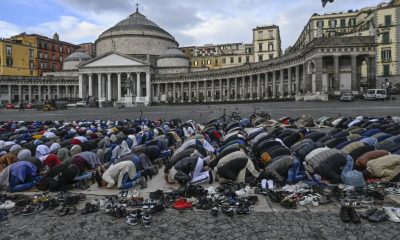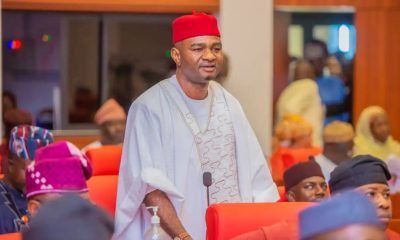Business
CBN goes after states, farmers over N600b unpaid loans

The Central Bank of Nigeria (CBN) has begun an aggressive drive to recover the loans it gave out under its development finance interventions.
Top on the list of debtors are state governments whose monthly Federation Account Allocation Committee (FAAC) accruals are already being debited directly every month. The deductions will last six months.
Director, Development Finance of the CBN Yusuf Yila, who disclosed this during a post-Monetary Policy Committee (MPC) in Abuja yesterday, did not name the debtor states.
Yila, who named the Anchor Borrowers Programme (ABP) and Commercial Agric Credit (CAC) as some of the intervention programmes, said: “Every person(s) or state that took that loan (ABP) is going to pay. We have their BVN.”
Such persons referenced by Yila are smallholder farmers, who received funds for farming from state governments via the ABP, but have yet to pay them back.
- ’20’ Burnt To Death As Tanker Explodes In Kogi
- APC Plunges Into Major Crisis As Adamu Bombs Tinubu In a Leaked Letter
- Photos: APC youths hold mini-rally in Abuja
The CBN director added that the apex bank was collaborating with the Economic and Financial Crimes Commission (EFCC) to ensure that the loans were recovered.
Yila said while the ABP loan repayments were particularly poor, that of CAC was almost excellent.
Under the ABP, the CBN gave out about N1 trillion but recovered only N400 billion. But under the CAC, the bank. lent out about N800 billion and recovered N700 billion.
His words: “We have started recovering loans from state governments. We have been doing a loan workout programme with them and we are debiting their monthly FAAC accruals directly for the loans.
“If a state government has taken N1 billion and is already in default, over a six-month period, we debit them N150 million every month. So, we’ve started that programme..
“So, every single loan that has been given out through any of our intervention programmes must be paid back.
“There is the ABP which is a primary consumption element of our interventions. We lent out N1 trillion for the ABP of which we have gotten over N400 billion back.
“Every single person or state that took that loan (ABP) is going to pay. We have their BVN. In fact, we have started implementing the Global Standing Instruction (GSI).
“We will continue to pull the account in the bank that they lent to or whichever bank that they have account. Anytime we see money in that account, we will recover it.
“We are working with the EFCC. The CBN governor has approved the collaboration with the EFCC on loan recoveries.”
Yila also said that credit facilities extended to businesses and individuals have not performed poorly.
READ ALSO:
- ‘Stupid’ decisions caused me multi-million dollar deal – Cardi B
- Two dead, many injured in Lagos transport workers’ fracas
- No insurance cover for train terrorism victims – NRC
According to him, out of the N9 trillion intervention fund to spur economic growth, about N5 trillion is still under moratorium.
Another staff member of the CBN, who did not want his name in print, said there was “an intervention facility that state governments accessed for projects but had failed to pay back.”.
He explained that “the CBN wrote to the states reminding them of payment as per our recovery drive but they decided to fight back by seeking the reduction of the bank’s powers.”.
The staff member made reference to the debate by the Senate on Tuesday on whittling down the powers of the CBN governor.
The Director, Banking Supervision of the CBN, Haruna Mustapha, spoke on the implications of Tuesday’s interest rate hike by the apex bank.
Mustapha said that “banks will make more profit from interest charged on loans and will reprice existing loans to borrowers.”
This, according to him, “will be transferred to bank customers and this will add to cost of borrowing. “
Adding that “interests on government securities will also go up, ” he said the CBN has given approval to banks to increase interest on savings deposits to 30 percent effective.
“We increased it from 10 percent to 20 percent and it stands to reason that since we hiked MPR yesterday(Tuesday) to 15.5 percent, it will change the equation. The effective date is September,” Mustapha said.
The Nation
Auto
CFAO subsidiary LOXEA unveils BYD electric vehicles in Nigeria

CFAO subsidiary LOXEA unveils BYD electric vehicles in Nigeria

A subsidiary of CFAO Mobility, LOXEA Nigeria, has introduced the BYD brand of electric vehicles to the Nigerian market.
LOXEA has thus become the pioneer in bringing the renowned electric vehicles (EVs) manufactured by BYD (Build Your Dreams) into the country.
BYD is a high-tech multinational company and the world leader in electric and plug-in hybrid vehicles.
“As a Fortune Global 500 enterprise, BYD relentlessly innovates to create a sustainable future,” said the automaker.
“In November 2024, BYD becomes the first company in the world to achieve the milestone with the roll-off of its 10-millionth NEV.
“BYD achieves 4.27 million new energy vehicle sales in 2024, claiming the global sales champion in the third consecutive year.”
Managing Director of LOXEA Nigeria, Mr. Mehdi Slimani, stated, “We are proud to distribute this type of electric vehicle and all its associated services.
“Our upcoming showroom in Victoria Island, Lagos will be a place dedicated to the discovery of BYD vehicles, combining modernity, comfort, and economy of use. “It is very important for CFAO Mobility in Nigeria to participate in this way in the country’s energy transition and support our customers who wish to make the switch to electric.”
Chief Executive Officer of CFAO Mobility, Marc Hirschfeld, spoke on the importance of this launch for both the company and the country, saying, “BYD is one of the world’s leading manufacturers of electric vehicles, with a level of innovation know-how that now matches the expectations of our markets in Africa.
“A whole new ecosystem has to be designed around mobility in African cities.
“This applies not only to individual and corporate customers, but also to stakeholders including urban public transport networks and government agencies.
LOXEA specialises in providing innovative mobility solutions across Africa.
With a commitment to sustainability and excellence, it delivers high-quality mobility services, from electric vehicle leasing to fleet management and infrastructure support.
LOXEA is a leading player in innovative mobility solutions in Africa, offering clients a range of 100% electric vehicles from BYD.
As a pioneer in the deployment of electric vehicle solutions across the continent, LOXEA is bringing to Nigeria a comprehensive suite of services associated with electric vehicles.
This includes the installation of electric charging stations, vehicle maintenance, repair services, and the provision of spare parts.
In addition to providing an inaugural charging station at the upcoming LOXEA Victoria Island showroom, the company is also offering an adaptable solution that allows customers to charge their EVs conveniently at home.
The company says more information on this can be obtained from its website: https://www.byd-nigeria.com/ .
Business
Petrol price rises to N935 in Lagos

Petrol price rises to N935 in Lagos
Petrol marketers across the Lagos metropolis at the weekend raised the pump price of the commodity to between N925 per litre and N935 per litre.
This is in response to the increase in the landing cost of petrol, the stoppage by Dangote Refinery of the sales of the commodity in naira about two weeks ago and the delay in conclusion of negotiation on the naira for crude policy.
Last Monday, the landing cost of the commodity rose to N843.28 per litre from a previous N797 per litre a forthnight ago.
This increase represents an addition of N46 per litre to the landing cost of petrol.
Some filling stations like TotalEnergies sold at N935 per litre; MRS, N925.
ARA is a crucial global oil and biofuel hub known for its physical infrastructure, pricing benchmarks, and significant oil consumption.
It added that seasonal refinery maintenance across Europe and a recent fire at the Falconara refinery in Italy have further restricted supply, adding to market tightness and price volatility.
The Association said the foreign exchange rate remained fairly stable, with minimal fluctuations observed over recent periods.
Therefore, the landing cost of petrol, being fundamentally influenced by these elements, is likely to change several times intra-day.
It advised that savings can be achieved through negotiations, access to foreign exchange, and logistics efficiencies, for example, by eliminating Ship to ship (STS) transfer where possible or receiving larger cargos.
MEMAN explained that the landing cost into Apapa/ASPM Jetty is calculated based on the following assumptions: exchange rate, finance charges at 32 per cent per annum for 30 days; STS and related charges; NIMASA charges at two per cent of local STS; NMDPRA at 0.5 per cent MDGIF; NPA and VAT charges covering towage, berthage/mooring, ship dues, cargo dues, contingency, fire coverage, agency fee; other costs at N2 per litre.
Petrol price rises to N935 in Lagos
Business
Dangote Refinery: MRS, other filling stations increase petrol price
Dangote Refinery: MRS, other filling stations increase petrol price
The price of petrol has surged to N930 per litre in Lagos and N960 in northern states, following the recent suspension of naira payments for crude oil by the Dangote refinery.
MRS filling stations implemented the new pricing structure on March 28, 2025, marking a N70 increase from the previous rate of N860 in Lagos and N80 higher than the former N880 in the North.
Other fuel retailers have also adjusted their prices, with NIPCO reportedly selling at N930 per litre in Magboro, Ogun State, on Saturday.
According to MRS Oil & Gas, trucks will load products from its Lagos depot and distribute them across the country at varying costs.
The company’s latest pricing document confirms that Lagos has the lowest fuel rate, while northern states face the highest prices. However, the company did not specify whether it sourced its supply from the Dangote refinery.
Under the revised price framework, petrol now costs N930 per litre in Lagos, N940 in other South-West states, and N960 in the South-South and South-East regions, including Edo, Abia, Akwa Ibom, Bayelsa, Rivers, Cross River, and Enugu.
READ ALSO:
- Ex-Rivers HoS wife cries for help over husband’s safety
- Fubara reacts as Ex-HOS, Nwaeke accuses him of bombing oil pipelines, Rivers Assembly
- Natasha: Emmanuel Uduaghan threatens to sue Senator Nwaebonyi
In the North, Abuja, Kaduna, Benue, Kogi, Niger, Sokoto, Kebbi, and Nasarawa will pay N950 per litre, while Zamfara, Kano, Jos, Bauchi, Taraba, Adamawa, Borno, Katsina, Jigawa, Gombe, and Yobe will pay N960.
The Free Carrier Agreement (FCA) price, which determines how much marketers pay before reselling fuel, also differs by region. Lagos has the lowest FCA price at N905 per litre, whereas states like Borno, Taraba, Adamawa, and Yobe have FCA prices around N888 per litre.
The recent suspension of the naira-for-crude initiative by the Dangote refinery was attributed to discrepancies in crude oil allocation. Sources indicate that the Nigerian National Petroleum Company Limited (NNPCL) allocated large volumes of crude to foreign creditors to settle outstanding loans, making it difficult to sustain local transactions in naira.
As a result, independent fuel importers have taken advantage of the situation, increasing depot prices. Industry analysts warn that the rising petrol costs could drive up transportation fares and the prices of goods and services.
Experts suggest that prices may stabilize once the Dangote refinery secures a reliable crude oil supply from NNPCL and resumes selling in naira. Until then, consumers across the country will have to contend with higher fuel costs.
Dangote Refinery: MRS, other filling stations increase petrol price
(PUNCH)
-

 Uncategorized3 days ago
Uncategorized3 days agoBreaking: Moon sighted in Saudi, UAE, others, Eid-Fitr holds Sunday
-

 metro2 days ago
metro2 days agoRamadan ends in Nigeria, Sultan announces March 30 as Eid-el-Fitr
-

 metro3 days ago
metro3 days agoFubara reacts as Ex-HOS, Nwaeke accuses him of bombing oil pipelines, Rivers Assembly
-

 metro3 days ago
metro3 days agoEmbrace environmental sanitation during Eid-Fitr, LAGESC boss tells Lagosians
-

 metro3 days ago
metro3 days agoEx-Rivers HoS wife cries for help over husband’s safety
-

 International1 day ago
International1 day agoIn pictures: Eid celebrations around the world
-

 metro3 days ago
metro3 days agoNatasha: Emmanuel Uduaghan threatens to sue Senator Nwaebonyi
-

 Auto3 days ago
Auto3 days agoLanre Shittu Motors to endow Automobile Department of Lagos Technical College





